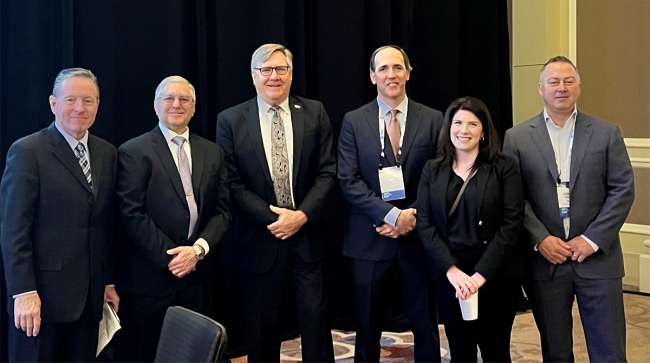Senior Reporter
Port Leaders at Legislative Summit Want Permitting Reform

[Stay on top of transportation news: Get TTNews in your inbox.]
WASHINGTON — As U.S. ports spend more than $20 billion in federal and state money to upgrade their facilities to make them competitive with operations in Europe and Asia, port leaders say the permitting and government review process to get projects approved needs to be improved.
Those were some of the conclusions of five panelists at the annual American Association of Port Authorities Legislative Summit on March 20.
“We plan many of our projects out five and six years, and the current system adds a lot to the cost. Something that we are looking at now and we budget for will cost much more in five years when it’s done. A lot of this has to do with the slow pace of permitting,” said Jamie McCurry, chief administrative officer at the Georgia Ports Authority, noting that the Port of Savannah, where he works, is in the midst of a billion-dollar expansion plan that will double its capacity by 2030. “We plan for contingencies because it is unavoidable that your costs will change over time, no matter how good your estimator might be.”
All of the panelists said they support newly introduced bipartisan legislation in Congress called the Permitting Optimization for Responsible Transportation Act, designed to streamline permitting and materials regulations for maritime transportation. It was introduced by Rep. David Rouzer (R-N.C.) and Rep. Mary Peltola (D-Alaska), who touted the bill’s aim to clear a path to build and modernize ports and harbors faster.
@GaPorts Chief Administrative Officer Jamie McCurry joins senior port executives from around the nation for the American Association of Port Authorities (AAPA) Legislative Summit in Washington D.C.
McCurry shared ways the GPA is committed to moving the maritime industry forward… pic.twitter.com/L7bq49duKu — Georgia Ports (@GaPorts) March 20, 2024
“Everyone wants a predictable infrastructure,” Bill Hanson, senior vice president of Great Lakes Dredge and Dock, told the audience of more than 200. He said dredging projects his company did 70 years ago that took 18 months to two years to complete now routinely could take up to 10 years, partly because of permitting issues. “This requires an urgency.”
Port of Alaska Director Steve Ribuffo said his port also faces additional challenges because of the state’s extreme weather, which severely limits the construction period to about seven months. Also, because of Alaska’s remoteness, substantial cost is added to every project.
“We are probably at the end of a very long supply chain. Nothing is cheap to get to us,” he said. “Nothing comes fast. In Alaska, 90% of the freight comes in on marine vessels. We are an island. We have no rail connection, no utility connections to the outside world, and one road that goes through a foreign country that connects Alaska to the lower 48.”

Elaine Nessle, executive director at the Coalition for America’s Gateways & Trade Corridors, said part of the challenge ports face is turnover on Capitol Hill. Once a person becomes a subject-matter expert on a particular area they’ll leave and move into the private sector.
“There’s been a certain amount of brain drain on Capitol Hill,” she said. “You have lawmakers and staff who understand the problem, and then they leave as soon as they’ve got it down. You’re constantly in a cycle of educating and re-educating.”
Nessle said the Permitting Optimization for Responsible Transportation Act is a solid first step toward permitting reform in Washington. But its passage is not assured. 2024 is an election year, and Congress has a concise calendar of workdays before senators and members of Congress begin to campaign full time for the November election; she sees little chance the legislation will pass this year, and it will have to be reintroduced in January and start all over.
“This bill represents a lot of meaningful changes, not just on the permitting side of things, but on the funding side of things,” she said.
All of the panelists, including Sergio Sabatini, president and COO of transportation and transportation infrastructure holding company OmniTrax, insisted they are on board with federal and state environmental regulations and want to build projects with minimal disruption to local communities.
Want more news? Listen to today's daily briefing above or go here for more info
“We’re being very proactive and establishing the relationships at the right levels of government, specifically at the grassroots level,” he said. “This is something we are always looking at in today’s world: how to protect wetlands and other environmental issues that can pop up. We must stay close to our stakeholders and work with them to understand what may be coming at you.”
Nessle said, “There are case studies across the country where ports have done a beautiful job of talking early and often with faith-based communities in their region and other types of community groups, stakeholders they have identified who are very engaged and active and can mobilize on these issues. Through early education and discussing the jobs that can be delivered and the benefits of the projects, there have been really good outcomes.”


